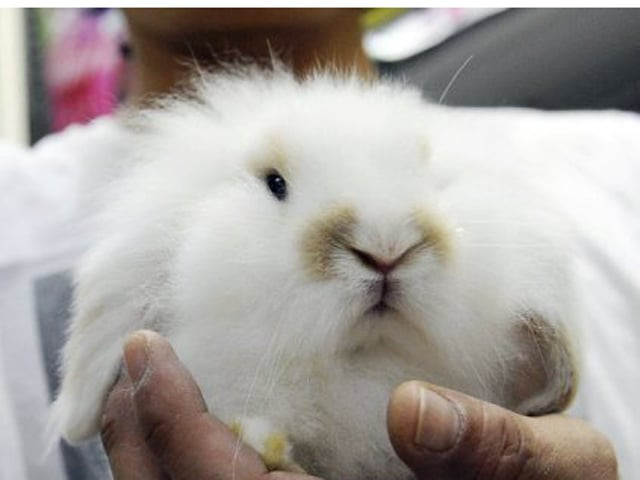Pet bunnies in peril as Year of the Rabbit nears
Animal-welfare groups in Asia are warning of abandoned and neglected bunnies.

Pet retailers across the region are seeing brisk demand for the furry, fast-breeding creatures ahead of the Lunar New Year, which falls on February 3 in the Chinese almanac.
"There's no better time to help rabbits than during the Year of the Rabbit, and you can do so by refusing to support the pet trade that causes so many animals to suffer," said activist Maggie Chen from People for the Ethical Treatment of Animals (PETA).
"Rabbits aren't just cute and fluffy, they're high-maintenance animals who require significant resources, equipment, attention and veterinary care."
As the Year of the Tiger draws to a close, Thai retailer Eakmon Prempinitpong says his rabbit sales via the Internet have roughly doubled thanks to customers buying them as presents for their sweethearts.
"The main customers are teenagers and college students," Eakmon said.
In China, rabbit sales are also up, with shop owners touting them ahead of dogs and cats as perfect household companions -- and affordable as well.
Prices vary from $3.00-$39.50 depending on the breed.
"Sales from January 1 until now are nearly as good as sales for all of last year," one vendor at the Nanshan pet market in the northeastern city of Qingdao was quoted by Chinese media as saying.
"They look cute and are easy to care for," the vendor said.
It is exactly such sales pitches that worry animal-welfare groups and veterinarians who say bunnies suffer from the misconception that they are easy to maintain.
"Many people buy pets on impulse and do not fully understand the responsibilities of keeping an animal at home," said Jacelyn Heng, president of the bunny-loving group House Rabbit Society Singapore.
"The problem is particularly acute for rabbits because people wrongly assume that they are low-maintenance starter pets for children.
"Many pet shops in Singapore are also not well-informed about the care needed for a pet rabbit and often provide wrong or false information to the unknowing first-time owners."
Thai veterinarian Thosaporn Anuntakulnatee from the Faculty of Veterinary Science in Bangkok's Chulalongkorn University agreed.
"Some people don't know how to take care of the rabbits and end up throwing them away in the wild or leaving them at a temple," he said.
"Rabbits can breed quickly, and we will have a problem controlling their population, especially if they are an alien species."
When the last Year of the Rabbit occurred in 1999, the Society for the Prevention of Cruelty to Animals (SPCA) in Singapore took in 625 pet bunnies that had been abandoned or given up by their owners.
That was a 116 percent spike from the previous year.
The SPCA says it is too early to predict if this year will turn out to be any different but it is not taking anything for granted.
It has joined hands with the House Rabbit Society Singapore to urge the public not to fall into the trap of buying a pet bunny on impulse.
"Just as we would like to be optimistic, we have learnt to be cautious from our past experience as to whether or not people are going to be tempted to buy bunnies," Deirdre Moss, the executive director of the SPCA, told AFP.
"Unfortunately, we are living in a consumer-oriented society -- people get tempted easily especially when it's cute and cuddly," she said.
"We are just keeping our fingers crossed. Hopefully, it won't be the same as it was 12 years ago. We just hope that members of the public who get tempted will think twice."
Abandonment is not the only threat to bunnies in Asia during the festive season.
Some restaurants are offering rabbit-meat dishes for the Lunar New Year celebrations, which last for 15 days until February 17.
One such restaurant is Szechuan Court in Singapore, where head chef Sebastian Goh has specially created a spicy rabbit stew that includes other prized Chinese delicacies like abalone and dried scallops.
"I thought that this would be an auspicious opportunity to introduce rabbit meat to Chinese diners by adding it into this dish, as rabbit is very seldom featured in Chinese cuisine," said Goh.



















COMMENTS
Comments are moderated and generally will be posted if they are on-topic and not abusive.
For more information, please see our Comments FAQ